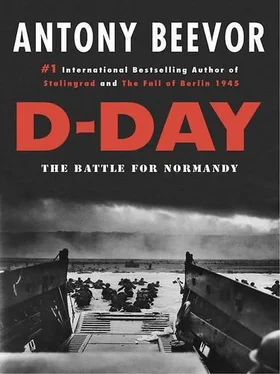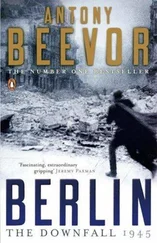Bletchley Park, the highly secret complex about fifty miles north-west of London which decoded enemy signals, adopted a new watch system for Overlord from 22 May. Its experts were ready to decrypt anything important the moment it came in. Thanks to these ‘Ultra’ intercepts, they were also able to check on the success of Fortitude disinformation provided by the main ‘Double Cross’ agents, Pujol, Dusko Popov (‘Tricycle’) and Roman Garby-Czerniawski. On 22 April, Bletchley had decoded a German signal which identified the ‘Fourth Army’, with its headquarters near Edinburgh and two component corps at Stirling and Dundee. Other messages showed that the Germans believed that the Lowland Division was being equipped for an attack on Norway.
Ultra decrypts revealed in May that the Germans had carried out an anti-invasion exercise, based on the assumption that the landings would take place between Ostend and Boulogne. Finally, on 2 June, Bletchley felt able to report: ‘Latest evidence suggests enemy appreciates all Allied preparations completed. Expects initial landing Normandy or Brittany followed by main effort in Pas-de-Calais.’ It looked as if the Germans really had swallowed Plan Fortitude.
Early on 2 June, Eisenhower moved into a trailer hidden in the park at Southwick under camouflage nets. He dubbed it ‘my circus wagon’, and when not in conference or visiting troops, he would try to relax by reading westerns on his bunk and smoking.
At 10.00 hours that Friday, in the library in Southwick House, Stagg gave Eisenhower and the other assembled commanders-in-chief the latest weather assessment. Because of the continuing disagreement among his colleagues, particularly the over-optimistic American meteorologists at SHAEF, he had to remain Delphic in his pronouncements. Stagg knew that by the evening conference he must produce a firm opinion on the deterioration of the weather over the weekend. The decision to proceed or to postpone had to be made very soon.
At the same meeting, Air Chief Marshal Sir Trafford Leigh-Mallory, the air commander-in-chief, outlined the plan ‘to establish a belt of bombed routes through towns and villages thereby preventing or impeding the movement of enemy formations’. He asked whether he was free to proceed ‘in view of the civilian casualties which would result’. Eisenhower announced his approval ‘as an operational necessity’. It was decided to drop leaflets to the French to warn them.
The fate of French civilians was just one of many worries. As supreme commander, Eisenhower had to balance political and personal rivalries, while maintaining his authority within the alliance. He was well liked by Field Marshal Sir Alan Brooke, the Chief of the Imperial General Staff, and by General Sir Bernard Montgomery, the commander-in-chief of 21st Army Group, but neither rated him highly as a soldier. ‘There is no doubt that Ike is out to do all he can to maintain the best of relations between British and Americans,’ Brooke wrote in his diary, ‘but it is equally clear that he knows nothing about strategy and is quite unsuited to the post of Supreme Commander as far as running the war is concerned.’ Monty’s characteristically terse judgement on Eisenhower after the war was: ‘Nice chap, no soldier’.
These opinions were certainly unfair. Eisenhower demonstrated good judgement on all the key decisions over the Normandy invasion and his diplomatic skills held a fractious coalition together. That alone represented a considerable feat. Brooke himself acknowledged that ‘national spectacles pervert the perspective of the strategic landscape’. And nobody, not even General George S. Patton, was as difficult to deal with as Monty, who treated his supreme commander with scant respect. At their very first meeting he had ticked off Eisenhower for smoking in his presence. Eisenhower was too big a man to take such things badly, but many of his American subordinates felt he should have been tougher on the British.
General Montgomery, despite his considerable qualities as a highly professional soldier and first-class trainer of troops, suffered from a breathtaking conceit which almost certainly stemmed from some sort of inferiority complex. In February, referring to his famous beret, he had told King George VI’s private secretary, ‘My hat is worth three divisions. The men see it in the distance. They say, “There’s Monty”, and then they will fight anybody.’ His self-regard was almost comical and the Americans were not alone in believing that his reputation had been inflated by an adoring British press. ‘Monty,’ observed Basil Liddell Hart, ‘is perhaps much more popular with civilians than with soldiers.’
Montgomery had an extraordinary showman’s knack which usually radiated confidence to his troops, but he did not always receive a rapturous response. In February, when he told the Durham Light Infantry that they were to be in the first wave of the invasion, a loud moan went up. They had only just returned from fighting in the Mediterranean and had received little home leave. They felt that other divisions which had never left the British Isles should take their place. ‘The bloody Durhams again’ was the reaction. ‘It’s always the bloody Durhams.’ When Montgomery drove off, all ranks were supposed to rush to the road to cheer him on his way, but not a man moved. This caused a good deal of angry embarrassment among senior officers.
Monty had been determined to have seasoned troops to stiffen the untried divisions, but this idea was greeted with a good deal of resentment by most of his desert veterans. They had been fighting for up to four years abroad and considered that it was now the turn of others, especially those divisions which had not yet been committed in any theatre. A number of former Eighth Army regiments had not been home for six years, and one or two had been away for even longer. Their resentment was strongly influenced by wives and girlfriends at home.
The US 1st Division, known as the ‘Big Red One’, also grumbled when picked yet again to lead the way in a beach assault, but its experience was badly needed. A major assessment report on 8 May had rated almost every other American formation allocated to the invasion as ‘unsatisfactory’. American senior officers were stung into action and the last few weeks of intensive training were not wasted. Eisenhower was encouraged by the dramatic improvement, and privately grateful for the decision to postpone the invasion from early May to early June.
There were other tensions in the Allied command structure. Eisenhower’s deputy supreme commander, Air Chief Marshal Sir Arthur Tedder, loathed Montgomery, but he in turn was deeply disliked by Winston Churchill. General Omar Bradley, the commander of the First US Army, who came from poor Missouri farming stock, did not look very martial with his ‘hayseed expression’ and his government-issue spectacles. But Bradley was ‘pragmatic, unruffled, apparently unambitious, somewhat dull, neither flamboyant nor ostentatious, and he never raised hackles’. He was also a shrewd commander, driven by the need to get the job done. He was outwardly respectful towards Montgomery, but could not have been less like him.
Bradley got on very well with Eisenhower, but he did not share his chief’s tolerance towards that loose cannon, George Patton. In fact Bradley barely managed to conceal his intense distrust of that eccentric southern cavalryman. Patton, a God-fearing man famous for his profanity, enjoyed addressing his troops in provocative terms. ‘Now I want you to remember,’ he once told them, ‘that no bastard ever won a war by dying for his country. You win it by making the other poor dumb bastard die for his country. ’There is no doubt that with out Eisenhower’s support at critical moments, Patton would never have had the chance to make his name in the coming campaign. Eisenhower’s ability to keep such a disparate team together was an extraordinary achievement.
Читать дальше











